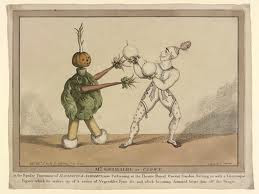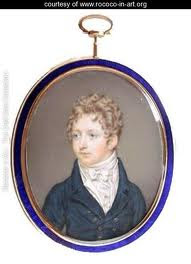 |
| Drury Lane Theatre in the late 17th century |
Susanna/h Percival was likely born in 1667. Her father, Thomas Percival, was a lesser actor in the Duke's Company of players, and as did many a young person of her era, she entered the family business. Her initial stage appearances may have taken place during her childhood but by 1681, when she was about 14, she was performing with the King's Company in Drury Lane. Her first known role was the vulgar character Welsh Winnifred in Thomas D'Urfey's play Sir Barnaby Whig. In 1683, as a member of the United Company at the Dorset Garden Theatre, she was seen in a breeches role, listed in the bill as Mrs Percival--actresses, whether wed or not, were typically referred to as "Mrs". From the start of her career her skill for comedy and her attractiveness in male costume were apparent to playgoers, and managers and playwrights exploited these assets.
She married a handsome and popular fellow player, William Mountfort/Mountford, on 2 July, 1686, at the church of St. Giles in the Field. Apparently she was one of the rare respectable actresses who maintained her virtue until her wedding day, for Sir George Etheredge observed that, "Mrs Percivall [sic] had only her youth and a maidenhead to recommend her." He, along with Dryden, thought little of Mrs Mountford's talents in these early years--perhaps because of the limited, low-comedy nature of her parts.
Over time, however, she was given more sophisticated roles, often performing opposite her charming husband. Playwrights sometimes relied on the couple's marital partnership as inspiration. Mountford, who wrote as well as performed in plays, included his wife in his compositions, creating more of the breeches roles for which she was so popular. He is also credited with inventing the immortal phrase "be still my beating heart," a line in his play Zelmane.
 |
| Thomas Southerne |
Her home life must have been as taxing as her professional life. She bore three children in quick succession: Susannah (b. 1690); an infant son who died (1691); and Elizabeth, who suffered the same early death as her brother (1692). By late 1692 she was pregnant once more, but tragedy prevented her husband from meeting his fourth child.
Captain Richard Hill was an admirer of the popular and outwardly chaste actress Anne Bracegirdle, who frequently appeared opposite William Mountford. When she rebuffed Hill's overtures, he jumped to the mistaken conclusion that she granted her favours to her on-stage lover Mountford. Madly jealous, he and his crony Lord
 |
| Charles, 4th Baron Mohun |
A thousand people attended the actor's funeral at St Clement Danes. His popularity with the monarchs was such that the Royal Chapel choristers sang at the service, and court musician Henry Purcell played the organ. On that sorrowful occasion, the great church bell cracked from repeated tolling.
Susanna gave birth to a fatherless daughter the following April and christened her Mary at St Clement's. Captain Hill had escaped, first to the Channel Islands and then to the Continent, and thus could not be tried for the actor's murder. But the House of Lords did hear the case against his conspirator Lord Mohun, and promptly voted acquittal. Susanna fully intended to appeal what she regarded as a most unjust verdict, but was prevented by another family tragedy.
On 17 Oct ’93 her father, Thomas Percival, was sentenced to death for clipping coins—a capital offence. Only by abandoning her appeal, she was told, could she save him from hanging. One account indicates that that she directly petitioned Queen Mary II:
Under this most unparalleled affliction she was introduced to Queen Mary, who being as she was pleased to say struck to the heart upon receiving Mrs Mountfort's petition, immediately granted all that was in her power, a remission of her father's execution, and afterwards was graciously pleased to procure a mitigation of his sentence, which was changed to that of banishment [transportation]. But Mr Percival being weakened by his long imprisonment fell ill upon the road and died at Portsmouth.
Susanna's widowhood was brief, for on 31 January, 1694, she married her fellow actor John Baptista Verbruggen at St Clement Danes. He had previously performed under the stage name Alexander, and first appeared at Drury Lane in 1688. This was apparently a union of necessity at worst, convenience at best, rather than a romantic one. Verbruggen was an energetic and skillful actor, for according to Aston, "That rough diamond shone more bright than all the artful polished brilliants that ever sparkled on our stage...nature without extravagance, freedom without licentiousness, and vociferous without bellowing." He was also rough of speech, short-tempered, and prone to violence. As for Susanna, “She was cautious, lest fiery Jack should so resent it, as to breed a quarrel--for he would often say--‘Damme! tho’ I don’t much value my wife, yet nobody shall affront her!’ and his sword was drawn on the least occasion.”
 |
| Thomas Betterton, actor and manager |
1. John Verbruggen agrees that, for a payment of £75, his wife will act in the theatre.
2. Susanna Verbruggen to have £4 out of £20 ... if this does not amount to £105 per year (i.e £3 a week for 35 weeks) this sum shall be made up to her. At the end of every 6 acting days (except when the young actors play for their own benefit) she shall have £3 till the whole £105 is completed. If, on the other hand, her share comes to more than £105 she shall be allowed to keep it.
 |
| Charles Beauclerk, 1st Duke of St Albans |
On learning of the incident, the Lord Chamberlain advised Verbruggen to make a public apology to St Albans from the stage, or else lose his place in the company. The next evening the actor complied, however his apology was couched in such terms that it hardly negated the insult. He retained his place at Drury Lane. Susanna's opinion of what occurred, and her precise relationship with the duke, if any, remain a matter of speculation.
In 1697 Verbruggen broke with Drury Lane, after verbally abusing Skipworth, striking another individual, and breaking the peace. When he left to join Betterton's troupe at Lincoln's Inn Fields, Susanna remained at Drury Lane--fortunate for its proprietors. Her importance and popularity was as considerable as her talents. She played society coquettes, ladies disguised as men, and low-life characters with equal flair and success.
One of Susanna's greatest admirers was Colley Cibber, as proved by his descriptions of her in his memoirs.
Mrs Mountfort, whose second marriage gave her the name of Verbruggen, was mistress of more variety of humour than I ever knew in any one woman actress. This variety too was attended with an equal vivacity, which made her excellent in characters extremely different. As she was naturally a pleasant mimic, she had the skill to make that talent useful on the stage a talent which may be surprising in a conversation and yet be lost when brought to the theatre….But where the elocution is round, distinct, voluble, and various as Mrs Mountfort's was, the mimic there is a great assistant to the actor. Nothing, though ever so barren, if within the bounds of nature, could be flat in her hands. She gave many heightening touches to characters but coldly written, and often made an author vain of his work that in itself had but little merit. She was so fond of humour, in what low part soever to be found, that she would make no scruple of defacing her fair form to come heartily into it….
 |
| Colley Cibber, actor and dramatist |
In the summer of 1703 she failed to accompany her fellow players to Bath, pleading illness--she was pregnant. She went into labour on 2 September, and died in childbirth. Her husband, who after her death performed with various London companies and in Dublin, outlived her by just five years.
One hopes that she found satisfaction in the artistry that pleased her audiences so well. Several incidents described above appear in my recent novel about the Duke and Duchess of St Albans, and in researching Susanna I both liked and pitied her. On stage she portrayed independent women of spirit, yet it seems that the men in her offstage life--to whom she was so valuable--held the balance of power. And it is these men only whose portraits survive, and illustrate this article.
[This article is an Editors' Choice, originally published on 21 April 2016]
~~~~~~~~~~
 Margaret Porter is the award-winning and bestselling author of twelve period novels, whose other publication credits include nonfiction and poetry. A Pledge of Better Times, her highly acclaimed novel of 17th century courtiers Lady Diana de Vere and Charles Beauclerk, 1st Duke of St. Albans, is her latest release, available in trade paperback and ebook. Margaret studied British history in the UK and the US. As historian, her areas of speciality are social, theatrical, and garden history of the 17th and 18th centuries, royal courts, and portraiture. A former actress, she gave up the stage and screen to devote herself to fiction writing, travel, and her rose gardens.
Margaret Porter is the award-winning and bestselling author of twelve period novels, whose other publication credits include nonfiction and poetry. A Pledge of Better Times, her highly acclaimed novel of 17th century courtiers Lady Diana de Vere and Charles Beauclerk, 1st Duke of St. Albans, is her latest release, available in trade paperback and ebook. Margaret studied British history in the UK and the US. As historian, her areas of speciality are social, theatrical, and garden history of the 17th and 18th centuries, royal courts, and portraiture. A former actress, she gave up the stage and screen to devote herself to fiction writing, travel, and her rose gardens.Margaret's latest novel is A Beautiful Invention: A Novel of Hedy Lamarr, available fore pre-order HERE








